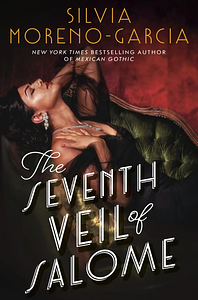Take a photo of a barcode or cover
emotional
sad
tense
slow-paced
Plot or Character Driven:
Character
Strong character development:
Yes
Loveable characters:
Yes
Diverse cast of characters:
Yes
Flaws of characters a main focus:
Yes
It took me a minute to get into this book but when it hooked me, I couldn't put it down!
Graphic: Racial slurs, Racism
The Seventh Veil of Salome is incredibly well written. It’s probably my second favorite Silvia Moreno-Garcia book so far (and that’s only because Mexican Gothic is so good.)
The embedded layers of narrative are expertly well handled, and circle so well with the question of who gets to set history threaded through the novel. Who is and isn’t reliable, who is actually telling the story, and if we are supposed to see any true reincarnation are all questions that are satisfied, if not truly resolved. (Because they don’t need to be and this novel lets you ponder!)
It’s a book that’s a classic tragedy in the sense that we’re told from the beginning it is one. Then there’s one storyline where we know the tragic ending and the question is how we get there, and another storyline where we know it’ll be tragic and we’re spiraling to it but don’t know how.
And even despite that the ending isn’t emotionally devastating and Moreno-Garcia will not let our dual heroines suffer for other’s machinations. (No spoilers, but she’s always been an expert writer on that front).
This book was also such a good exploration of ways patriarchy (both in the ancient world, the 50s, and today) offers women limited options and uses racism to turn them against one another. Nancy isn’t unsympathetic (remarkably) but she is unquestionably racist and shaped to blame a Mexican woman for her troubles rather than look at her own failings or how the sexist system she grew up in is really at fault. And it’s this twisting and her own refusal to accept responsibility that leads to the novel’s violent conclusion.
Moreno-Garcia has always been skilled at presenting complex women and complex themes, while never losing the story she’s telling. Seventh Veil of Salome really illustrates her skill at layering it all. 100% recommend.
The embedded layers of narrative are expertly well handled, and circle so well with the question of who gets to set history threaded through the novel. Who is and isn’t reliable, who is actually telling the story, and if we are supposed to see any true reincarnation are all questions that are satisfied, if not truly resolved. (Because they don’t need to be and this novel lets you ponder!)
It’s a book that’s a classic tragedy in the sense that we’re told from the beginning it is one. Then there’s one storyline where we know the tragic ending and the question is how we get there, and another storyline where we know it’ll be tragic and we’re spiraling to it but don’t know how.
And even despite that the ending isn’t emotionally devastating and Moreno-Garcia will not let our dual heroines suffer for other’s machinations. (No spoilers, but she’s always been an expert writer on that front).
This book was also such a good exploration of ways patriarchy (both in the ancient world, the 50s, and today) offers women limited options and uses racism to turn them against one another. Nancy isn’t unsympathetic (remarkably) but she is unquestionably racist and shaped to blame a Mexican woman for her troubles rather than look at her own failings or how the sexist system she grew up in is really at fault. And it’s this twisting and her own refusal to accept responsibility that leads to the novel’s violent conclusion.
Moreno-Garcia has always been skilled at presenting complex women and complex themes, while never losing the story she’s telling. Seventh Veil of Salome really illustrates her skill at layering it all. 100% recommend.
dark
medium-paced
Plot or Character Driven:
Character
Strong character development:
Complicated
Loveable characters:
Complicated
Diverse cast of characters:
Yes
Flaws of characters a main focus:
Complicated
adventurous
fast-paced
Plot or Character Driven:
Plot
Strong character development:
Yes
Loveable characters:
Yes
Diverse cast of characters:
Yes
Flaws of characters a main focus:
Yes
Over all this book was really disappointing. The “twist” was predictable, the characters mostly frustrating, and the refusal to actually bring up what happened was sooo over done. The book builds and builds to a conclusion that is clearly seen, which is often my issue with Moreno’s books.
challenging
dark
reflective
sad
fast-paced
Plot or Character Driven:
A mix
Strong character development:
Yes
Loveable characters:
Complicated
Diverse cast of characters:
Yes
Flaws of characters a main focus:
No
Ahoy there mateys! There is something about Moreno-Garcia's writing that always works for me. This historical fiction novel was no exception. It takes place in 1950s Hollywood where a big budget film about the life of Salome is preparing for production. Everyone is surprised when the director casts Vera Larios, a Mexican woman with no experience as the lead. Another American actress named Nancy is appalled and wants revenge for "her" part being stolen. The novel focuses on how the film changes their lives forever.
The two elements I loved best about the novel were the atmosphere and the characterizations. The Hollywood of the 1950s was not always as glamorous as the films themselves would suggest. There was rampant racism, misogyny, and studio control over the talent. In addition the Red Scare caused actors to be blackballed. Studios also could influence who actors dated and, in the case of gay men, encourage them to marry to hide their sexual preferences. Vera Larios, as a Mexican, is treated with disdain. She is not considered white. Getting the part of Salome is a big deal but Hollywood treats the young actress more as a possession of the studio than a real person. I thought the undercurrent of Hollywood politics was extremely well done because the overt and subtle impacts to the talents' lives were woven throughout the novel.
I also loved the characterization. Vera is controlled by her mother and familial obligation of the Mexican culture. She is a bit naive but also resourceful in her own way. She lives in the shadow of her sister being the family favorite. I was rooting for every gain she made towards personal freedom. I also had a lot of sympathy for how poorly Hollywood treated her. Nancy, on the other hand, was someone I loved to dislike. She has a lot of freedom but also has family pressure in trying to obtain her father's approval. Nancy has truly horrible taste in men. She is manipulative, abusive, and cunning. Her focus on blaming Vera for all her woes was ridiculous yet realistic and the conflict this entailed was excellently done. I felt that both women's endings were so sorrowful in their own ways. The other interesting character in this novel was Salome herself. We learn about her life in the palace, her uncle's desire for her, her marriage prospects, and her fascination with John the Baptist. This storyline was my least favorite but it did add for some interesting parallels with the 1950s.
Overall, I loved this novel even if I will likely not reread it. I love the author's work and am looking forward to The Bewitching coming out later this year. Arrrr!
I received a copy from the publisher in exchange for an honest review.
The two elements I loved best about the novel were the atmosphere and the characterizations. The Hollywood of the 1950s was not always as glamorous as the films themselves would suggest. There was rampant racism, misogyny, and studio control over the talent. In addition the Red Scare caused actors to be blackballed. Studios also could influence who actors dated and, in the case of gay men, encourage them to marry to hide their sexual preferences. Vera Larios, as a Mexican, is treated with disdain. She is not considered white. Getting the part of Salome is a big deal but Hollywood treats the young actress more as a possession of the studio than a real person. I thought the undercurrent of Hollywood politics was extremely well done because the overt and subtle impacts to the talents' lives were woven throughout the novel.
I also loved the characterization. Vera is controlled by her mother and familial obligation of the Mexican culture. She is a bit naive but also resourceful in her own way. She lives in the shadow of her sister being the family favorite. I was rooting for every gain she made towards personal freedom. I also had a lot of sympathy for how poorly Hollywood treated her. Nancy, on the other hand, was someone I loved to dislike. She has a lot of freedom but also has family pressure in trying to obtain her father's approval. Nancy has truly horrible taste in men. She is manipulative, abusive, and cunning. Her focus on blaming Vera for all her woes was ridiculous yet realistic and the conflict this entailed was excellently done. I felt that both women's endings were so sorrowful in their own ways. The other interesting character in this novel was Salome herself. We learn about her life in the palace, her uncle's desire for her, her marriage prospects, and her fascination with John the Baptist. This storyline was my least favorite but it did add for some interesting parallels with the 1950s.
Overall, I loved this novel even if I will likely not reread it. I love the author's work and am looking forward to The Bewitching coming out later this year. Arrrr!
I received a copy from the publisher in exchange for an honest review.
adventurous
dark
mysterious
tense
fast-paced
Plot or Character Driven:
Character
Strong character development:
Yes
Loveable characters:
Yes
Diverse cast of characters:
Yes
Flaws of characters a main focus:
Yes
dark
emotional
mysterious
reflective
sad
fast-paced
Plot or Character Driven:
A mix
Strong character development:
Yes
Loveable characters:
Complicated
Diverse cast of characters:
Yes
Flaws of characters a main focus:
Yes
reflective
tense
medium-paced
Plot or Character Driven:
A mix
Strong character development:
Complicated
Loveable characters:
Complicated
Diverse cast of characters:
Yes
Flaws of characters a main focus:
Yes



